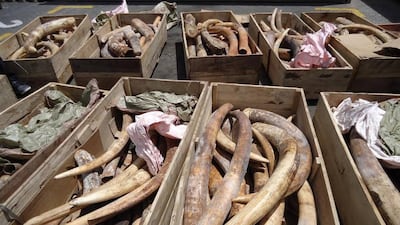DUBAI // Police are increasing their efforts in the battle against elephant poaching in a campaign warning transit passengers that it is illegal to carry ivory.
They will remind those travelling through Dubai International Airport that wildlife protection laws forbid the transport of ivory across international borders.
Information in English, Arabic and Chinese, will be displayed until the end of June on 28 electronic screens in Terminals 1 and 3.
This is the second year of the campaign, with authorities hoping to eventually get the message across to a million passengers.
As ivory smuggling mostly follows a route from Africa to the Far East, Brig Ali Atiq bin Lahej, director of the General Department of Airport Security at Dubai Police, said Dubai’s location made the focus on transit passengers important.
“Dubai airports are at the crossroads between Asia and Africa and that is why the General Administration focused on transit points to ensure ivory is not smuggled,” Brig bin Lahej said.
“The police have the ability to detect smuggling attempts, especially of goods that affect elephants and wildlife. We have a strong partnership with Dubai airports to provide state-of-the-art devices and capabilities to detect smuggled goods.”
The campaign is organised in partnership with the Ministry of Environment and Water and the International Fund for Animal Welfare.
“It is a warning message to traders and people who own ivory not to bring ivory to Dubai,” said Dr Elsayed Mohamed, regional director for the Middle East and North Africa at the fund. “The major destinations for ivory are China and Thailand.”
Dubai’s strategic position as a travel centre makes it a target for smugglers, he said.
“From the confiscations happening here you can see that ivory is passing through Dubai Airport,” Dr Mohamed said. “It is geography, you cannot change it.”
One of the most significant seizures was in May last year, when 259 tusks were found in a ship at Jebel Ali Port. The official cargo records claimed the items were pieces of furniture.
In November 2012, a haul of 215 tusks was discovered at the same port. The ship’s owners had registered the cargo as white beans.
Under UAE law, people caught smuggling endangered animals or animal parts face jail sentences of up to six months, fines of up to Dh50,000, or both.
Demand for ivory has long affected elephant populations. After protection measures appeared to be reducing the levels of poaching in the 1990s, it appears elephants are again being killed en masse.
The UN report Elephants in the Dust: the African Elephant Crisis shows poaching has intensified since 2007. In 2011, about 17,000 elephant deaths were recorded at sites monitored by scientists in Africa, with the number for the entire continent believed to be as high as 25,000.
In many countries, especially those in central and western Africa, the number of animals targeted by poachers exceeds the growth rates of the populations.
“If this continues, we will face a point of no return for elephant populations,” said Dr Mohamed.
vtodorova@thenational.ae
